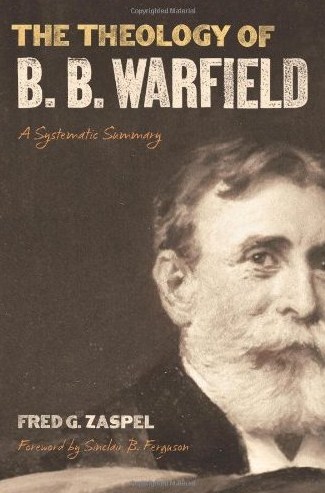Book Review: The Theology of B. B. Warfield


The Theology of B. B. Warfield: A Systematic Summary, Fred G. Zaspel, Wheaton: Crossway, 2010. Hardcover, 624 pages, $44.00.
Ninety years after his death, Benjamin Breckinridge Warfield continues to be a respected voice in Reformed theology. Along with Jonathan Edwards, the Hodges, and a few others, Warfield is one of the pre-eminent Reformed theologians in North American church history. Yet for all his renown, few have given him a careful reading. Popular ideas persist about what Warfield believed about this or that. Part of the problem is Warfield himself never systematically laid out his theology in one place.
Fred Zaspel has therefore done us a favour by carefully collating Warfield’s theology into one helpful volume. After an introduction surveying Warfield’s life and work, Zaspel follows the standard topics of systematic theology and distils Warfield’s thought on each one. Here and there he also interacts with interpreters, particularly the ones whom Zaspel feels have not done justice to Warfield.
Zaspel himself is a sympathetic interpreter. A Reformed Baptist pastor in Pennsylvania, he is broadly in agreement with Warfield’s theological bent. Where he personally might depart from Warfield (regarding infant baptism, for instance), Zaspel remains respectfully silent, just simply laying out the Princeton theologian’s views without comment. At the end of the volume he does offer some critique, but for the most part he allows Warfield to speak for himself. That’s not to say the book consists mostly of quotations – most of the time Zaspel summarizes and paraphrases.
The Theology of B. B. Warfield will appeal most to pastors, scholars, seminary students and informed “lay people.” Like Warfield himself, it is not light and fluffy. Technical language is used and readers are expected to have an intermediate level of theological knowledge.
There are four areas in the book especially worthy of further comment. Early on, Zaspel deals with Warfield’s views on apologetics. He argues that Warfield has been unfairly portrayed by later Reformed apologists such as Cornelius Van Til. Van Til argued that Warfield did not give adequate expression to the effects of sin upon the unregenerate mind. Zaspel attempts to defend Warfield against this accusation. He notes that Warfield did not attribute “right reason” to the unbeliever and spoke repeatedly of the pervasiveness of sin (77-78). However, Zaspel also states that Warfield maintained that unregenerate man “is able to see the compelling force of ‘right reason.’” Unfortunately, Zaspel is unable to see that this justifies Van Til’s complaint. While he adds some useful nuance to Warfield’s views, Zaspel does not succeed in exculpating Warfield on his inconsistencies in apologetics.
Warfield is known as the great defender of biblical inspiration and inerrancy. Therefore, one would expect a book of this nature to deal with those subjects at length. Zaspel does not disappoint. He outlines how contemporaries of Warfield and latter-day interpreters have accused the Princetonian of “rationalistic scholasticism” in his doctrine of the Bible. He helpfully illustrates how these charges fall well short of the mark.
A third area of interest is Warfield’s thought on evolution. The claim is often made that Warfield had an appreciation for evolution. The argument is advanced that if Warfield can be regarded as a great Reformed theologian and he held to evolution, then how can contemporary advocates of evolution be excluded from Reformed churches? Those making such claims ought to read Zaspel’s careful summary of Warfield’s views and how they developed. He concludes Warfield could at best be said to have been noncommittal or to be critically agnostic (386-387). However, Warfield also developed a “strengthening conviction against evolution” (385).
Finally, one of Warfield’s greatest concerns was the influence of perfectionism or Keswick “higher life” spirituality. In his day there were popular preachers and writers claiming it was possible for Christians to no longer sin in this age. There were also those who claimed that Christians should not regard themselves as sinners, since they are a “new creation in Christ.” They denied the biblical teaching that, in this age, we are both justified and sinners (simul iustus et peccator). These false teachings are still around today. Today we still need Warfield’s biblical defense against these errors. Zaspel provides a helpful door. Warfield approvingly quoted Thomas Adam, “The moment we think we have no sin, we shall desert Christ” (465).
The Theology of B. B. Warfield is a comprehensive guide to the thought of “the Lion of Princeton.” There’s no question it will be a standard reference for decades to come. Anyone interested in the development of Reformed theology on our continent needs to have it and read it.


